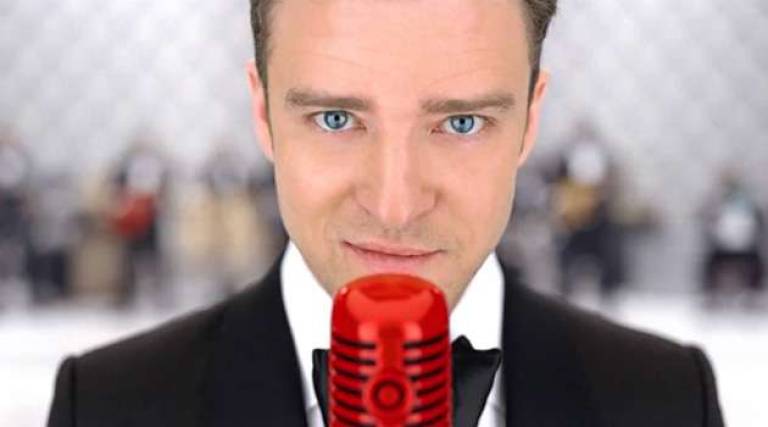Knee Deep in 20/20 Experiences

Timberlake defines himself and today's pop
By Ben Kessler
Justin Timberlake's enduring commercial, critical, and street-level success can perhaps best be explained with an insight from Sigmund Freud: There is no "negative" in the unconscious.
Ironically, though, in our messed-up culture JT's shameless lack of negativity must be defined negatively. In other words, JT demands to be known by what he blessedly is NOT.
Ever since his emergence as a solo artist with Justified (2002), JT's charisma has made for great showbiz by dramatizing the impact of black pop culture on the mainstream. At the beginning of his solo career, he certainly benefited from opposition to Eminem's purely negative co-optation of hiphop.
JT's new album The 20/20 Experience corrects our current view of pop culture by reversing negative trends, including those advanced by less imaginative artists aping his success.
Take Taylor Swift's recent hit "I Knew You Were Trouble." Swift's succession of singles supposedly inspired by high-profile breakups follows the JT template that won him success with the kiss-off tracks "Cry Me a River" (2002) and "What Goes Around?Comes Around" (2007).
But Swift's song's breakup is both romantic and musical: She parts ways with the country-western milieu "Trouble" was clearly meant for and inspired by. Choosing impersonal Top 40 production over the rootsy instrumentation that might have made her sentiments relatable (if nowhere near as original as JT's producer Timbaland's ever-effervescent grooves), Swift ensures her hit is a zeitgeist affair, saturated in the ego-stroking love of disappointment that characterizes dominant youth culture.
Now consider JT's epic love song "Mirrors." Unlike other 20/20 tracks that pay explicit homage to black pop icons (Al Green on "That Girl," Curtis Mayfield on "Pusher Love Girl"), "Mirrors" is, for most of its 8:06 running time, sonically untethered: a mix of beatboxing, handclaps, synths, strings, and guitars that shouldn't create a pleasing sound but does. When JT sings, "It's like you're my mirror/My mirror staring back at me," it doesn't reflect narcissism but an awesome and awed faith in the mystery of human connection. And especially when JT sings the chorus with only handclaps and a swirling guitar riff behind him (a moment made for stadium gigs), "Mirrors" turns that faith into a participatory event.
The song's coda achieves true genius as its melody - at the unlikeliest of times, five and a half minutes in!! - resolves into an r
JT brings pop artistry back by reminding us that the primary mission of a pop musician is to make us feel and dance. That's both the power and subject of "Don't Hold the Wall," which contains what is possibly the album's key lyric, addressed to a coy dancing partner: "You're so far out/I had to come get you." Against expectation, the song is not a banger, but insinuates with an exotic (bhangra-inspired), erotic aural rhetoric. No matter how far out the culture gets, JT and Timbaland will come get us.